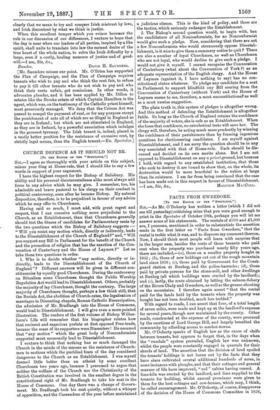CHURCH DEFENCE AS IT SHOULD NOT BE.
[TO THY Stores or rex srscumc.-j
Sm.,—I agree so thoroughly with your article on this subject, minus your fling at Home-rale, that I should like to say a few words in support of your argument.
I have the highest respect for the Bishop of Salisbury. His ability and his personal disinterestedness alike must always add force to any advice which he may give. I remember, too, his admirable and brave pastoral to his clergy on their conduct in political controversy, soon after he became Bishop. My natural -disposition, therefore, is to be prejudiced in favour of any advice which he may offer to Churchmen.
Having said so much, I must add, with great regret and respect, that I can conceive nothing more prejudicial to the Church, as an Establishment, than that Churchmen generally should test the fitness of candidates for Parliamentary seats by the two questions which the Bishop of Salisbury suggests
" Will you resist any motion which, directly or indirectly, leads to the Disestablishment of the Church of England?" and," Will you support any Bill in Parliament for the benefit of the Church and the promotion of religion that has the sanction of the Con- vocation of Canterbury and the House of Laymen P" Let us take these two questions in order.
1. Who is to decide whether "any motion, directly or in- directly, leads to the Disestablishment of the Church of England"? Different answers will be given in different con- etituencies by equally good Churchmen. During the controversy on Ritualism some Churchmen thought the Public Worship Regulation Act would lead to Disestablishment. Others, probably the majority of lay Churchmen, thought the contrary. The large majority of Churchmen thought, perhaps a few think still, that the Burials Act, the abolition of Church-rates, the legalisation of marriages in Dissenting chapels, Roman Catholic Emancipation, the admission of Mr. Bradlangh into the House of Commons, would lead to Disestablishment. I will give even a more pointed illustration. The readers of the first volume of Bishop Wilber- force's Life will remember that his biographer relates how that eminent and sagacious prelate at first opposed Free-trade, because the mass of its supporters were Dissenters ! He assumed that "any motion" which the great body of Nonconformists supported must necessarily lead to Disestablishment.
I venture to think that nothing has so much damaged the Church in the minds of the masses as the resistance of Church- men to motions which the purblind fears of the day considered dangerous to the Church as an Establishment. I was myself deemed little better than an atheist by some excellent Churchmen two years ago, because I presumed to argue that neither the welfare of the Church nor the Christianity of the British Constitution was involved in the smallest degree in the constitutional right of Mr. Bradlangh to take hie seat in the House of Commons. One day there was a change of Govern. ment. Mr. Bradlangh took hie seat quietly, without a whisper of opposition, and the Cassandra, of the year before maintained a judicious silence. This is the kind of policy, and these are the tactics, which seriously endanger the Establishment.
2. The Bishop's second question would, to begin with, ban the candidature of all Nonconformists, for no Nonconformist would give such a pledge. Now, considering that there are not a few Nonconformists who would strenuously oppose Disestab- lishment, is it wise to give them a summary notice to quit ? There are also a number of loyal Churchmen, as well as Churchmen who are not loyal, who would decline to give such a pledge. I would not give it myself. I cannot recognise the Convocation of Canterbury (what about the Convocation of York P) as an adequate representation of the English clergy. And the House of Laymen (against it, I have nothing to say) has no con- stitutional status whatever. To pledge any candidate for a seat in Parliament to support blindfold any Bill coming from the Convocation of Canterbury (without York) and the House of Laymen seems to me, therefore, a most unconstitutionef as well as a moat unwise suggestion.
The plain truth is, this system of pledges is altogether wrong. And this method of defending the Establishment is altogether futile. So long as the Church of England retains the confidence of the majority of voters, she is safe as an Establishment. When she loses that confidence, no catechetical tests will save her. The clergy will, therefore, be acting much more prudently by winning the confidence of their parishioners than by framing ingenious questions for electioneering candidates. I am myself against Disestablishment, and I am sorry the question should be in any way associated with that of Home-rule. Each should be dis- cussed and decided on its own merits alone. But I am not opposed to Disestablishment on any a priori ground, but because I hold, with regard to any established institution, that those who seek to destroy it are bound to show that, on the whole, its destruction would be more beneficial to the nation at large than its existence. I am far from being convinced that the case has been made out in this respect in favour of Disestablishment.























































 Previous page
Previous page